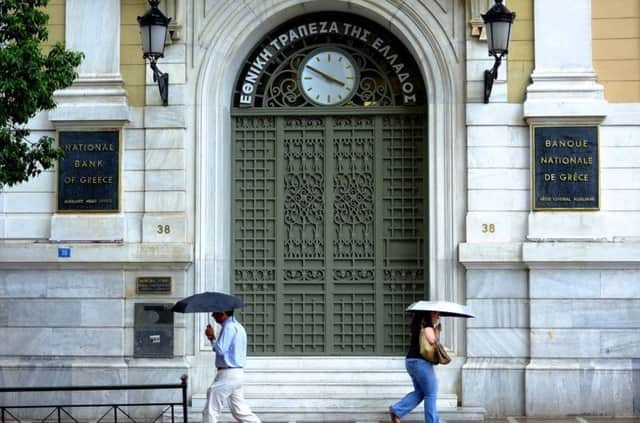Top UK share index hit by ‘triple whammy’


The FTSE 100 fell sharply, with investor sentiment damaged by Greece’s deepening debt crisis following the breakdown of talks with creditors and Athens’ imposition of capital controls.
Travel and leisure stocks were hit hard by events in Greece, a popular holiday destination for Europeans, and news that tour companies were evacuating thousands of holidaymakers from Tunisia after a gunman killed dozens of people at a beach hotel on Friday.
Advertisement
Hide AdAdvertisement
Hide AdThe FTSE 100 Index slumped two per cent to 6620.5 at the close of today’s session, while France’s Cac40 and Germany’s Dax were both more than three per cent down. The pound was flat against the euro at 1.41.
The FTSE came under pressure due to a 2.2 per cent drop in UK banking index after Greece closed its banks to check the growing strains on its crippled financial system.
Richard Hunter, the head of equities at Hargreaves Lansdown stockbrokers, said global markets had faced a triple whammy, with the deterioration in Greece, accompanied by the first chance to react to Friday’s terrorist atrocities and a further steep fall in Chinese markets.
However, Mr Hunter said investors could find that the “quality companies” they hold are actually relatively unaffected by some of these developments, “in which case we may yet witness some buying on these dips”.
Advertisement
Hide AdAdvertisement
Hide AdBanks such as HSBC and Royal Bank of Scotland suffered falls, while Holiday firms and airlines were also down with First Choice owner TUI 79p lower to 1034p.
David Scott, a Leeds-based investment manager and market commentator at Andrews Gwynne private wealth management, added: “Only weeks ago, the notion of a country leaving the euro was greeted with ridicule by European politicians. Now this uncertainty will hit both Yorkshire tourists heading to holiday in countries of the single currency, and Yorkshire companies whose livelihoods depend on healthy export markets, with the UK’s largest trading partner. Companies do not like uncertainty, and it does not come much greater than the prospect of a currency change.”
According to Mr Scott, companies doing business in the single currency are likely to act with much greater caution, which will slow economic activity at home.
He added: “The strengthening of sterling could also lead to job losses in export-focused companies, the car industry being particularly vulnerable. Thankfully, the Yorkshire economy is under-represented in this area. Greece is just part of a wider problem, as financial imbalances through Europe have been piled on to the same negative pressures and imbalances that never really went away.”
Advertisement
Hide AdAdvertisement
Hide AdChris Price, an investment specialist at Leeds-based stockbroker Redmayne Bentley, said: “Some well-known UK companies have large operations in Greece. However, the greater issue is the impact that a ‘Grexit’ would have on the other countries in Europe. Some of these are the UK’s largest trading partners, as half of the UK’s exports go to Europe. Therefore, the possibility of such an exit would have a far greater impact on the larger eurozone economies. It is this indirect fall out that could affect trading for Yorkshire-based companies, rather than events in Greece itself.”